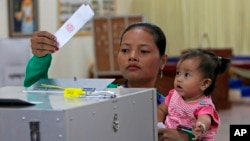The ruling Cambodian People’s Party has lodged a complaint against a prominent lawyer who has represented opposition officials and activists over comments he posted on social media appealing for an election boycott.
The complaint filed against Chuong Chou Ngy was sent to the National Election Committee (NEC), which has said it will seek prosecutions of Cambodians who take part in an online election boycott campaign spearheaded by leaders of the country’s former main opposition party, the Cambodia National Rescue Party.
The CPP claims that taking part in the campaign amounts to preventing Cambodians from voting, which is illegal, despite taking part in the campaign not actually impeding any Cambodians from taking part in Sunday’s general election.
Hang Puthea, NEC spokesman, could not be reached for comment.
Sok Eysan, CPP spokesman, said while citizens had the right to decide not to vote, Chou Ngy was preventing Cambodians from voting and was also on a list of 118 opposition figures banned from political participation by the Supreme Court in November when the CNRP was dissolved.
“If he keeps doing politics, he is breaking the verdict of the Supreme Court,” he said.
Chou Ngy could not be reached for comment on Wednesday, but in a video posted to Facebook, he had questioned the government’s logic when it came to the election boycott.
“This is a way of convincing people to stay away from voting. This is not prevention because if people want to vote, they can go to vote. Can’t they? Overseas people haven’t come to tie your legs and hands to prevent you from voting,” he said.
“So if you can go to vote, how are people overseas obstructing you? We don’t need to cynically interpret the act of convincing to be preventing. This is a dirty idea or dirty act of some gangsters.”
Under the election laws of Cambodia, preventing someone from voting can carry a fine of up to about $5,000.







